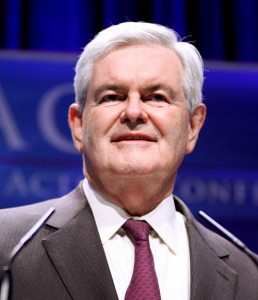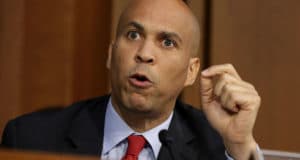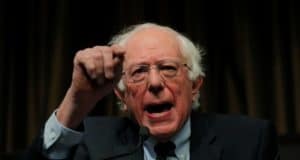Newt Gingrich was born in Harrisburg, Pennsylvania, on June 17, 1943. His mother, Kit, and father, Newton McPherson, were divorced before Newt was even born. Kit soon married Army officer Robert Gingrich, who later adopted Newt. As the youngest child in a career military family, Gingrich moved often, attended a number of public schools and eventually graduated high school in Columbus, Georgia, in 1961.
 Education dominated Gingrich’s life from the time he entered Emory University and on from there. While at Emory, he earned a B.A. in history in 1965 and then an M.A. in 1968. From there the budding scholar earned a PhD in modern European history from Tulane University in 1971. Well-suited for the academic life, Gingrich taught history at West Georgia College (now the University of West Georgia) for eight years.
Education dominated Gingrich’s life from the time he entered Emory University and on from there. While at Emory, he earned a B.A. in history in 1965 and then an M.A. in 1968. From there the budding scholar earned a PhD in modern European history from Tulane University in 1971. Well-suited for the academic life, Gingrich taught history at West Georgia College (now the University of West Georgia) for eight years.
Political Career
While still at Emory, Gingrich had his first taste of a political campaign as Southern regional director for Nelson Rockefeller. Gingrich ran for the Sixth Congressional District of Georgia in both 1974 and 1978, but was defeated both times by long-time Democrat incumbent, Jack Flynt. When Flynt chose to retire in 1978, Gingrich won the district handily and went on to be re-elected six times.
His first formal position with Republican Party leadership came in 1989 when Gingrich became Minority Whip. Among other things during this tenure, he and others Representatives known as the Gang of Seven sought to institute tighter ethical controls, which culminated in dealing with two noted scandals centered on the Congressional Post Office and House Banking. Ironically, Gingrich himself was found to have overdrafted twenty-two checks with the House bank, including one for almost $10,000 to the Internal Revenue Service.
Halfway through Bill Clinton’s Presidency, the Republicans gained fifty-four seats, seizing control of the House, and Newt Gingrich became Speaker of the House. Gingrich and others penned what became known as a Contract with America that proposed ten key policies that they promised to bring to a vote in the first hundred days of the new Congress. In a rare moment of politicians keeping their promise, the new Republican Congress kept its word and voted on all ten measures.
Partly fueled by Democratic opposition and partly brought on by Gingrich himself, the Speaker faced eighty-four charges of ethics violations during his tenure. Only one was not dropped. In 1997, Newt Gingrich became the first Speaker of the House in U.S. history to be disciplined for ethics violations. That and division within the party ultimately led to his stepping down from the Speakership and resigning from Congress in 1998. Though he has considered running for President in the past, 2012 marks the first Presidential campaign Gingrich has officially entered.
His Platform
Since New Gingrich has a long and well-documented political record, there are no doubt his stands and voting record will be easy targets for opponents and badges of honor for supporters. Here are some of his official stands, according to Newt.org:
Jobs and the Economy
- Stop the 2013 tax increases
- Eliminate the capital gains tax to make American entrepreneurs more competitive against those in other countries
- Dramatically reduce the corporate income tax (the highest in the world) to 12.5%
- Allowing for 100% expensing of new equipment to spur innovation and American manufacturing
- Ending the death tax permanently
- Move toward an optional flat tax of 15%
- Return to the Reagan-era monetary policies that stopped runaway inflation and reform the Federal Reserve to promote transparency
- Repeal the Sarbanes-Oxley Act, which did nothing to prevent the financial crisis and is holding companies back from making new investments in the U.S.
- Repeal the Community Reinvestment Act, the abuse of which helped cause the financial crisis
- Break up Fannie Mae and Freddie Mac, moving their smaller successors off government guarantees and into the free market
- Replace the Environmental Protection Agency with an Environmental Solutions Agency that works collaboratively with local government and industry to achieve better results
- Modernize the Food and Drug Administration to get lifesaving medicines and technologies to patients faster
- Implementation of an American energy policy that removes obstacles to responsible energy development
- Balance the budget by growing the economy, controlling spending, implementing money-saving reforms, and replacing destructive policies and regulatory agencies with new approaches
- Repeal and replace Obamacare
- Fundamental reform of entitlement programs
Truth about National Security – Gingrich isn’t as specific when it comes to his plans for national security. He has stressed the need to recognize radical Islam as a threat to Western Civilization. Gingrich says, “military force must be used judiciously and with clear, obtainable objectives understood by Congress.” And like many conservatives, he advocates protecting our borders but to date has offered no solid plan has to how to accomplish that task.
American Energy Plan – Several viable and much-needed goals are set forth in his energy plan:
- Remove bureaucratic and legal obstacles to responsible oil and natural gas development in the United States, offshore and on land
- End the ban on oil shale development in the American West
- Give coastal states federal royalty revenue sharing to give them an incentive to allow offshore development
- Replace the Environmental Protection Agency with an Environmental Solutions Agency that would use incentives and work cooperatively with local government and industry
Healthcare –Some of the things Gingrich supports include tax credits for health insurance as well as making that insurance portable, reforming Medicaid, instituting a High Risk Pool to cover the sickest without insurance, extending Health Savings Accounts throughout the entire health care system, and tort reform.
Gingrich also created a fire storm within his party recently when he questioned Congressman Paul Ryan’s campaign to fundamentally restructure Medicaid. When questioned by David Gregory of Meet the Press, he said:
I don’t think right-wing social engineering is any more desirable than left-wing social engineering. I don’t think imposing radical change from the right or the left is a very good way for a free society to operate.
In spite of his almost immediate backtracking, many Republicans were incensed by Gingrich’s attack on Ryan’s plan. Calling the plan “right-wing social engineering” may haunt his plans for a Presidential run even more than the other baggage Gingrich brings with him.
Personal Life – Public Image
Though the personal lives of other candidates and Presidents hasn’t seemed to hurt them (think Bill Clinton, Monica Lewinsky and Ken Starr), Gingrich seeks to run as a conservative, and their standards may just be a little higher. Many of the details of Gingrich’s personal problems have been distorted, but there is no doubt about the following facts.
At the age of nineteen Gingrich married his former high-school geometry teacher, Jackie Battley, who was twenty-six. After a lengthy affair, he asked his wife for a divorce while she was in the hospital for surgery. Six months after the divorce was finalized, Gingrich married Marianne Ginther in 1981. During the mid 90s, he became involved in an affair with Callista Bisekm, a Congressional staffer who was twenty-three years his junior. In another irony of his career, this affair was at its height during the time Gingrich had assumed leadership of the Republican investigation of President Clinton for perjury and obstruction of justice over his affairs with Monica Lewinsky. After divorcing his second wife, the two were married in 2000.
During an interview with David Brody of the Christian Broadcasting Network in 2011, Gingrich said, “There’s no question at times in my life, partially driven by how passionately I felt about this country, that I worked too hard and things happened in my life that were not appropriate.” For many, this sounds far too like the half-hearted of apologies of other Washington insiders caught in scandal.
Conclusions
There is no doubt that Newt Gingrich has contributed richly to the political landscape of America. His grasp of history and policy are far above most in the field, and his experience eclipses anything our current President could possibly claim. Many of his plans are echoed by a wide array of other conservative contenders for public office.
At the same time, Gingrich has not been able to overcome the cloud of personal indiscretions that follow him. And, his latest gaff in weakening Paul Ryan’s attempts to make real changes in Washington have all but sealed his hopes for a real run in 2012. In the end, Newt Gingrich is a Neo-Con for whom the luster began to fade a long time ago.
 Off The Grid News Better Ideas For Off The Grid Living
Off The Grid News Better Ideas For Off The Grid Living




